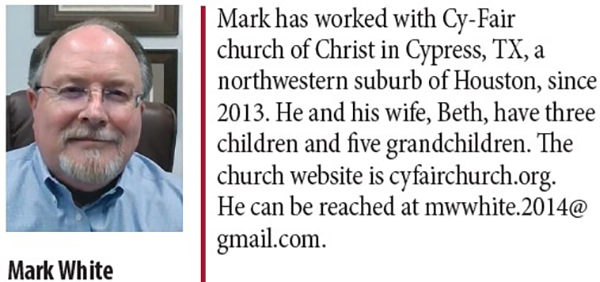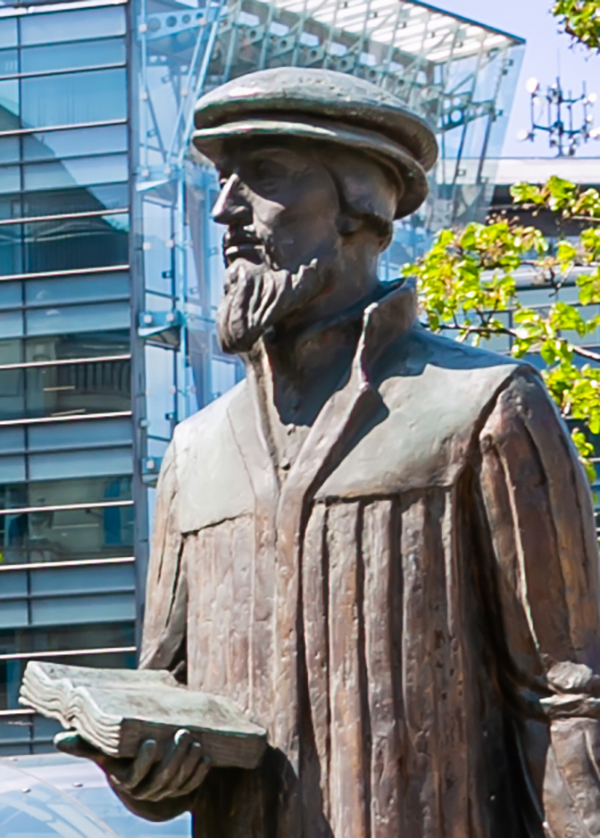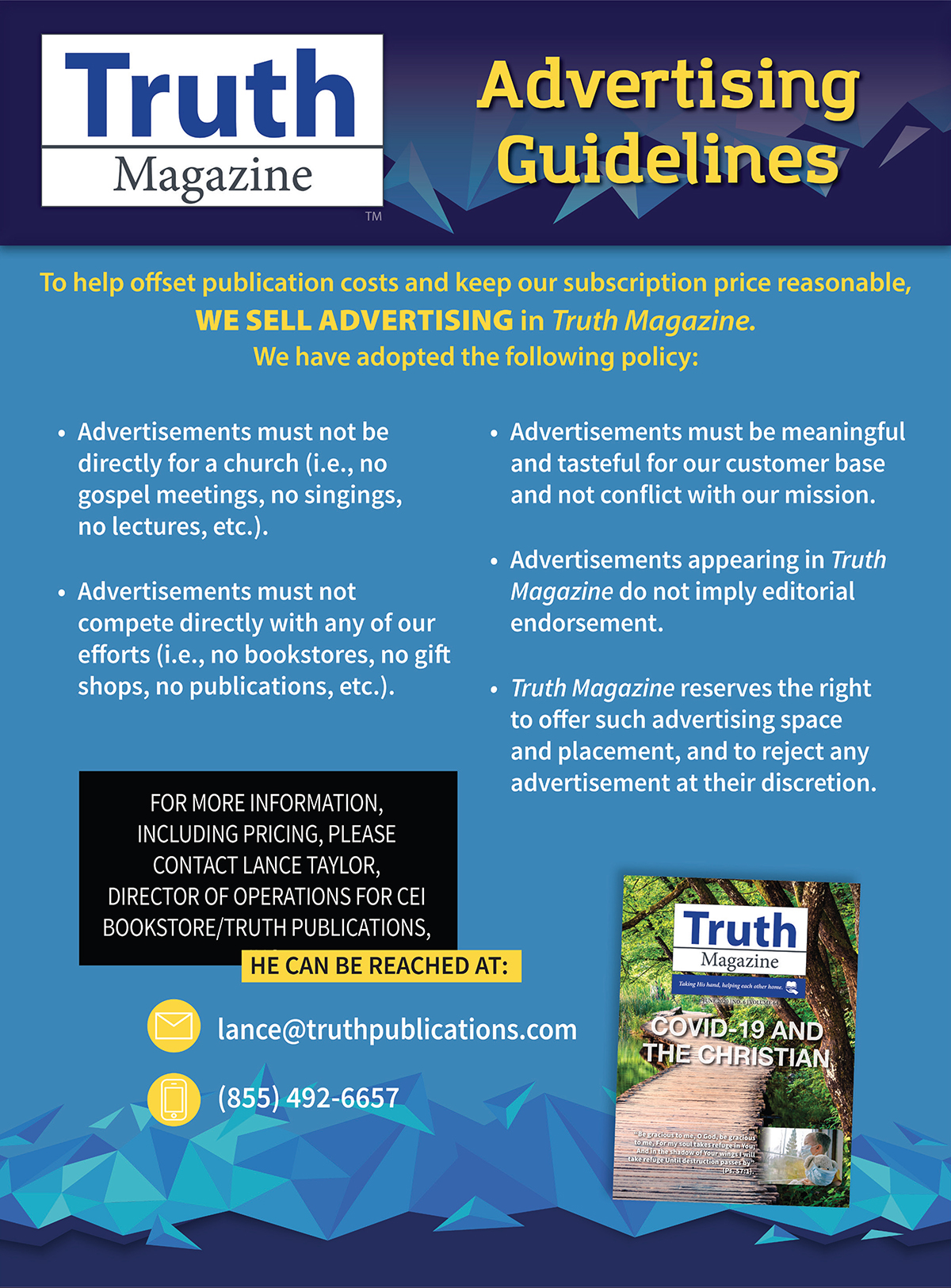by Mark White
Synopsis: The influence of the teachings of the Protestant leader, John Calvin, has been so pervasive that unless great caution is taken Christians unwittingly may find themselves using its unscriptural language about the Holy Spirit.
It’s an old problem. Long before there were Christians or even gospel preachers on Pentecost, God’s people had trouble adapting phrases from foreign sources and using them in their daily language. In Nehemiah’s era, he observed that some Jews had married people of Ashdod, Ammon, and Moab (Neh. 13:23). Consequently, such intermingling had resulted in new forms of expression. Verse 24 reports, “As for their children, half spoke in the language of Ashdod, and none of them was able to speak the language of Judah, but the language of his own people” (NASB). Jewish young people seemed to be especially vulnerable to this phenomenon. In our time, we often hear those young in the faith or years describing spiritual matters with the “language of Ashdod.” Ancient Ashdod was a Philistine city, a historic enemy city to Israel. Today, denominational expressions born from Calvinism find their way into our mouths. These words should sound just as strange to New Testament Christians as Ashdod speech sounded to Israelite ears.
You do not even have to know who John Calvin was to spout his doctrines. Many of those younger in the faith may not be as familiar as they need to be with the insidious nature of a doctrinal system developed by this Swiss reformer which has permeated the Protestant religious landscape for over five hundred years. Any idea that has been promulgated for over five centuries is bound to have a vast effect on the thinking of religious people. Certainly, Calvinism has made its deep mark on the minds of multitudes. The ready availability of books, publications, and popular preachers in our time has not helped us avoid Calvinistic expressions. Too many of us are enamored of teachers like John Piper, Al Mohler, or Mark Driscoll—all Calvinists in their theology. If we read deeply from them, we will begin to sound like them at some point, if we are not well-informed. Today, we are more likely to be influenced by a “New Calvinist” than traditional Calvinism. New Calvinism is not a new branch of theology or a denomination. Instead, it is a “revival” of sorts—a revival of traditional, “old” Calvinism. The movement is sweeping through American evangelical churches of all denominations, attracting young people from Free Church, Episcopal, Independent, Presbyterian, and Baptist churches alike. Since it started in 2007, The Gospel Coalition has served as the national network for the New Calvinist movement (thegospelcoalition.org).
For example, whenever we hear someone say, “I feel God is leading me to say this;” or “I feel led by the Spirit to preach this to you;” or, “I wouldn’t trade the feelings I have in my heart for a stack of Bibles ten feet tall”—you can know that someone has been influenced either directly or indirectly by Calvinist notions regarding the work of the Holy Spirit in our salvation and service to God. Most Protestants today will say they believe in Sola Scriptura (i.e., Scripture alone). However, most also make allowances for the Holy Spirit to make personal, private revelations to their minds which they often promote to others as equivalent to God’s words. “New Calvinists,” as opposed to “Old Calvinists,” believe in a continuing work of the Holy Spirit on men’s hearts and minds with spiritual gifts still in operation. In my personal experience, I once tried to teach a brother in Christ about the ills and sins associated with drinking alcoholic beverages. He refused to see the scriptural argumentation offered to him, insisting that the Holy Spirit was revealing something different to him about alcohol. That brother was influenced by “spirits” alright, but not the Holy Spirit! Whenever the word of the Holy Spirit in the Bible contradicted his preferences for drinking, he claimed to receive a revelation from the Spirit allowing him to ignore Bible teaching. Now, most do not justify their recreational or social use of alcohol by such means. Still, many do set aside biblical teaching whenever they feel something “better” or “different” from what Scripture says on other moral or doctrinal topics. It happens all the time, with credit being given to the Holy Spirit for contradicting His own revealed word! Whether or not they realize it, those who do so are blaspheming the Spirit.
Of course, the Bible does teach that we must be led by the Spirit (Rom. 8:14; Gal. 5:16-18). Yet, what the Bible means by such an expression and what modern denominations teach on this subject are often quite different. What does the Bible teach? First, it shows us that God used the Holy Spirit to reveal His truth to the apostles. Carefully read John 14:25-26. There, you will learn that Jesus was planning to leave this world and was aware that His apostles would need some help in His absence. The Holy Spirit was that Helper, Jesus said, and “He will teach you all things, and bring to your remembrance all that I said to you.” It is crucial to notice that this promise of the Spirit’s guidance was not given to every disciple of Jesus but was limited to the apostles. In 1 Corinthians 2:6-13, the apostle Paul gave credit for the truth he was preaching to the Holy Spirit, who revealed it to him, just as Jesus had promised the apostles in John 14. A closer look at what Paul wrote shows that the Holy Spirit did more than simply supply him with a sketchy outline of points, but He gave Paul the actual words he was to use in his teaching! There was nothing mystical or vague about the Holy Spirit leading Paul to write and speak as he did. Secondly, we must notice that in John 16:13, the apostles were told that the Spirit would “guide you into all the truth.” If the Holy Spirit guided these men into “all the truth,” how much truth is left to be revealed to you or me? Absolutely none! The Apostles received all that was needed for all time (Jude 3). The Holy Spirit leads our thoughts today through the truth He revealed to these ambassadors of Christ twenty centuries ago. 1 Corinthians 13:8-10 indicates that the time for this revelation would cease, along with other spiritual gifts, such as tongue-speaking, miracles of various sorts, “when the perfect comes” (v. 10, NASB). Now, the “perfect” which causes the “partial” to be “done away” is not Jesus, nor is it Heaven itself. The “perfect” is the completed revelation of God’s will in our New Testaments. The process of revelation was always a “little here and a little there” until all was finally completed. We are blessed to live in the age where all we will ever need to be led by the Spirit of God has already been perfected. Thirdly, we must not miss the fact that the Holy Spirit leads us through His revealed word, the Bible. The Holy Spirit does not nudge us, make hints, or strike us with lightning bolts or bright lights! He does not guide us by gut feelings or through little voices in our heads. Dreams are not sources of revealed truth for us today. The Spirit guides us through His word—the “word which lives and abides forever” (1 Pet. 1:23).
There is no need to borrow questionable expressions from the religious world to state Bible truths. “Whosoever speaks, is to do so as one who is speaking the utterances of God” (1 Pet. 4:11). Let us be content with the Lord’s language.
Unless otherwise noted, all Scripture quotations are from the New American Standard Bible: 1995 Update (NASB). La Habra, CA: The Lockman Foundation, 1995.


Statue of John Calvin in Calvin Square in Budapest, Hungary iStock-1204398342.jpg
